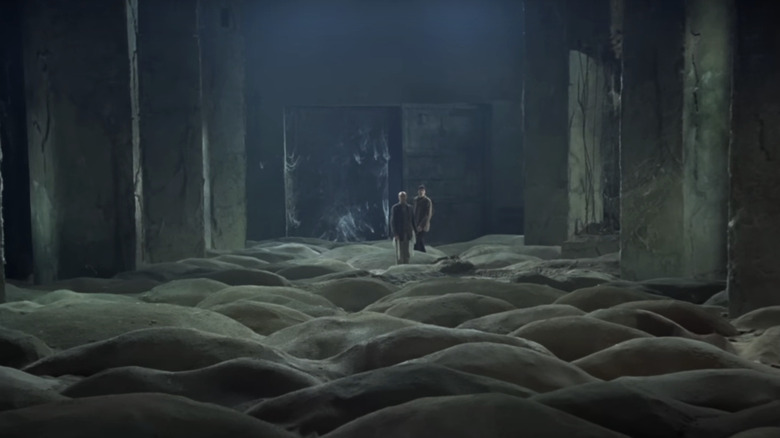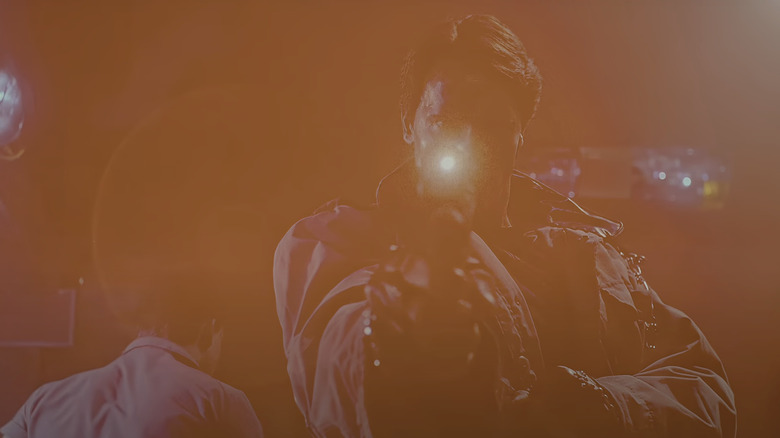There Are Only Two Perfect Sci-Fi Movies, According To Rotten Tomatoes
It doesn't mean anything to say a movie is "perfect" in any objective sense. Unless Rotten Tomatoes says it does, of course.
The website that Martin Scorsese considers "hostile to filmmakers" and which would have you believe that Rick Alverson's excellent "The Comedy" is a complete dud, is to many people the be-all and end-all of movie analysis. The site occupies such a vaunted position within film discourse that it has an inordinate sway over our own viewing habits. We've all been scrolling through some streaming service only to skip over a film because of a low RT score that is, for some reason, baked right into the interface. Likewise, if Rotten Tomatoes says a movie is "Fresh" then people are going to pay attention.
Look, it doesn't matter that last year a Rotten Tomatoes hacking scandal emerged, or that movie studios and streamers rely far too much on the Tomatometer as a marketing tool. It's not a big deal that the way in which RT scores are calculated is mysterious at best, or that Warner Bros. and Universal Pictures owner Comcast have stakes in the company. What matters is that Rotten Tomatoes gives us an easily digestible way to understand whether movies are "good" or not. So, if the website says a movie is "perfect," that obviously means the film is an incontrovertibly brilliant all-time classic, and everything else is not. When it comes to sci-fi — the genre to which such celebrated classics as "2001: A Space Odyssey" belongs — RT has evidently bestowed this esteemed designation to just two films. So get ready to dutifully follow the Tomatometer and only watch two sci-fi films for the rest of your life.
The only two perfect sci-fi movies ever made
Hey, it's totally fine that Rotten Tomatoes set up a needlessly restrictive binary between "Fresh" and "Rotten" movies because now, we've got yet another largely meaningless way to categorize art: the "perfect" RT score. We've already had the Royal decree declaring there will forever be only two perfect horror movies, and now we have official confirmation that there are also only two perfect science fiction films: James Cameron's startlingly prescient 1984 sci-fi slasher "The Terminator" and Andrei Tarkovsky's 1979 sci-fi thriller masterpiece "Stalker."
But what does it actually mean to have a "perfect" Rotten Tomatoes score? Well, the site works by aggregating approved critics' reviews and calculating a Tomatometer score. These critics submit reviews and, according to the site:
"When at least 60% of reviews for a movie or TV show are positive, a red tomato is displayed to indicate its Fresh status. When less than 60% of reviews for a movie or TV show are positive, a green splat is displayed to indicate its Rotten status."
Films or shows that maintain a "consistent Tomatometer score of 75% or higher," have at least five reviews from Top Critics, and meet various other seemingly arbitrary criteria are also eligible for the esteemed "Certified Fresh" designation. But even that elusive prize pales in comparison to achieving a perfect RT score, which basically just means a film has hit 100% on the Tomatometer. Currently, "The Terminator" and "Stalker" are the only two sci-fi movies to earn such a coveted ranking, which is fine. But surely this is just another reminder that RT scores really shouldn't command as much influence as they do.
If you're going to pick to perfect sci-fi films, you could do worse
If you were forced to pick two perfect sci-fi movies, you could do a lot worse than "The Terminator" and "Stalker." James Cameron's 1984 breakthrough remains as remarkable and relevant today as it was when it first debuted. Cameron himself believes the events of "The Terminator" could actually happen and in today's culture where the shadow of AI looms, ready to be welcomed with open arms by Joe Russo, that perspective feels unsettlingly reasonable. But aside from the unnerving sense that it's "sci" isn't all that "fi," "The Terminator" was and is just a damn good time at the movies, melding elements of slasher horror with sci-fi to make a wholly original film that, some dodgy practical effects aside, has stood the test of time.
"Stalker," meanwhile, is similarly unnerving but in a much more arthouse, slow-burn way than its fellow "perfect" film. Like "The Terminator," Andrei Tarkovsky's 1979 effort can, at times, feel like a horror movie, but contains a big psychological thriller aspect that stems from its science fiction premise. The titular Stalker is played by Alexander Kaidanovsky, and acts as a guide to a writer (Anatoly Solonitsyn) and a professor (Nikolai Grinko), both of whom seek to enter a restricted area known as "The Zone." Just what "The Zone" is remains somewhat ambiguous, beyond it being a heavily guarded region where some calamitous event occurred, creating a room capable of granting a person's deepest wishes.
Like "The Terminator," Tarkovsky's film is often included in lists of the top sci-fi movies, and was even ranked as the 29th greatest film ever made in the British Film Institute's 2012 list. So, if there's going to be a "perfect" sci-fi film ranking, both movies are certainly worthy of consideration.
Yet another reminder that Rotten Tomatoes isn't the be-all and end-all
While Rotten Tomatoes isn't necessarily proclaiming "The Terminator" and "Stalker" to be objectively perfect, the site is based on a ranking system that at least has the veneer of a somewhat objective process, which simply collates existing reviews and spits out an overall ranking.
But aside from the fact that these rankings are just aggregations of individual subjective opinions, they're also, as we've seen, open to manipulation. All of which is to say that it's fun to see which movies can attain the "perfect" RT ranking, but that's really all it is. While that may seem obvious, these percentage ratings have come to dominate much of the discourse surrounding film and TV, suggesting we might be taking it all a little too seriously. So, rather than wrap things up with more pessimism about the state of modern film and TV discourse, allow this to be a reminder of something hopefully reassuring: your own opinion is and always has been enough.



